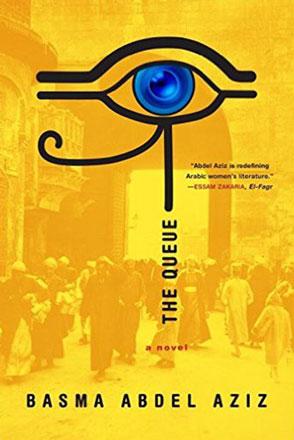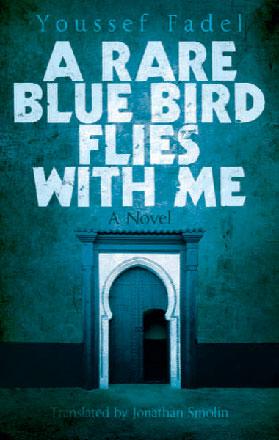You are here
The dangers of unchecked power
By Sally Bland - Feb 12,2017 - Last updated at Feb 12,2017

The Queue
Basma Abdel Aziz
Translated by Elisabeth Jaquette
Brooklyn-London: Melville House, 2016
Pp. 217
First published in Arabic (Cairo, 2013), this novel is both charming and horrifying. Charming because it centres on a triangle of friends who are so pure in their intentions and so loyal to each other. Though the author, Basma Abdel Aziz, describes them in a minimal way, they somehow come alive and make the reader care about them. Yet, in equal degree, the novel is horrifying because it describes a faceless dictatorship which seeps into and controls literally every aspect of citizens’ lives, always to their detriment.
Yehya was wounded in a protest demonstration. The bullet is still lodged in his stomach, causing internal bleeding and sapping his strength. Without an operation to remove it, he is doomed. His close friends, Nagy and Amani, will do anything to help him but at every attempt, they discover how powerless they are. Between them and the faceless authority is Tarek, a doctor of good conscience, who initially treated Yehya’s wounds: “Yehya had come straight to him, the first of the arrivals, his body a map of the battle”. (p. 25)
Then Yehya was inexplicably taken to the state hospital and released without further treatment.
Tarek is haunted by Yehya’s case, studying his file daily, knowing he will die unless operated on. He wants to do the operation, but is afraid as Yehya’s file is stamped with the words: “Suspended Pending Approval by the Gate”. Entries in the file are changed regularly without Dr Tarek knowing who is altering it. In fact, medical records are being falsified en masse, removing any reference to bullets to pretend that no protesters were shot by the police. Yehya has no choice but to wait in the queue that leads to the Gate.
The background for this situation is a popular uprising which would have overthrown a hated ruler, had it not split, with various factions turning against each other. Soon after, the Gate appeared. “As the ruler faded from the public eye, it was the Gate that increasingly began to regulate procedures… soon it was the singular source of all regulations and decrees… it controlled absolutely everything”. (p. 31)
New security forces appeared. Citizens had to obtain permission for the most commonplace things. Anyone suspected of dissent must stand in the queue to apply for a Certificate of True Citizenship if they wanted to keep their job.
The trick is that the Gate never opens, though the queue keeps getting longer until it becomes a world of its own. Needy persons sell tea and coffee to fellow waiters. So many people are required to wait that normal life grinds to a halt; shops close, people stay away from work, students do not attend school regularly, clinics are closed. The only official largesse is the free phones being given away — all from the same company — tools for surveillance and mind control. The sole newspaper available is ironically titled “The Truth”.
Doublespeak is rampant, claiming that all the inconveniences and injustices being perpetrated are for the citizens’ own good. People begin to argue with each other in the queue; rumours are spread to divide them against each other. Some disappear mysteriously and never come back.
Nagy, the most analytical of the three friends, wonders “what made people so attached to their new lives of spinning in orbit around the queue, unable to venture beyond it. People hadn’t been idiots before they came to the Gate with their paperwork.” Yet, here they are, all sorts of people, with “the same look about them, the same lethargy. Now they were all starting to think the same way.” (p. 90)
The big question posed by the novel is who will muster the courage to challenge the Gate, and whether they can succeed.
Abdel Aziz is an Egyptian journalist and psychiatrist who has treated many torture victims. Here, she describes a system of mass torture by remote control — the victims never see their torturers but nonetheless suffer horribly. While the events in “The Queue” are imaginary, the themes are not. Rather, they reflect the author’s perceptions of the world around her: the murder of protesters during the Arab uprisings, regimes that wield unlimited power without accountability and the Israeli system of permits, closures, walls, checkpoints and border crossings where Palestinians wait for hours, even days, to do whatever. The passages on “The Truth” newspaper and the alteration of records predict the “alternative facts” being propagated recently across the Atlantic.
This is a protest novel against bureaucracy which claims to facilitate citizens’ lives but actually wastes their time, and strangles their potential and very humanity. It exposes the dangers of unchecked power, and the injustice and cruelty it engenders. It is also a warning to people not to let themselves be manipulated and divided. “The Queue” is available at Books@Cafe.
Related Articles
A Rare Blue Bird Flies with MeYoussef FadelTranslated by Jonathan SmolinCairo-New York: Hoopoe/American University in Cairo Press, 2016Pp.
It is roughly a decade since the Nobel Prize in Literature ventured out of the global North. Even then, this year’s recipient, Abdulrazak Gurnah, resides in the UK, but he was born in Zanzibar, now part of Tanzania. His ancestry is Arab, his first language, Swahili, and his writing reflects this diverse background.
The Mercy SellerBrenda Rickman VantreaseNew York: St.


















